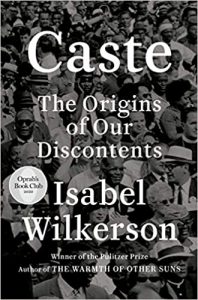Book Review: Caste: The Origins of our Discontent

Isabel Wilkerson is a formidable and distinguished writer. I wish I could stop right there, but I cannot. I finally got to read Caste: The Origins of our Discontent and I’m still not sure if I can recommend it or not. It is part of my job to read about race and ethnicity, but I was not sure how caste came into it. It is an excellent read when Wilkerson sticks to the subject. When academic writers plug their pages with quotations from other academic writers, it tends to get boring. I am looking for some original thoughts and Wilkerson half gives me what I am looking for.
This is the blurb that sold me on the book. “Beyond race, class, or other factors, there is a powerful caste system that influences people’s lives and behavior and the nation’s fate. Linking the caste systems of America, India, and Nazi Germany, Wilkerson explores eight pillars that underlie caste systems across civilizations…”
I was just getting into what was meant by the similarities between race, ethnicity, and caste, when the author started quoting other authors one after another to tell me what she had already told me.
Never-the-less, the author does show that the caste system existed in many ways, often she just uses caste for racism. Some of it is hard to take. She completely misses the fact that the Nazis were looking towards taking some of their punishments from the Jews, the Jewish community had its own type of caste system with their 12 Tribes and she doesn’t think that white people can experience the bad side of racism or caste systems. She even discusses caste in the animal world (alpha dog), politics, and things we never even thought about.
I am always on the lookout for biracial or multiracial people in a book, Wilkerson doesn’t fail on page 276 when she glosses over ‘MUTTS AND HEINZ 57.” Boy, that did fail me.
Read Caste or not. It could have been edited down to half its size just by taking out the other academic comments that will bore you, but you will learn things you never learned before.
Susan Graham for Project RACE
